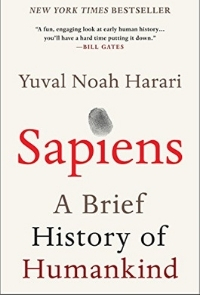
Sapiens: A Brief History of Humankind
Written by: Yuval Noah Harari
Reviewed by: Brad Williamson
Genre: Non-fiction / Theory
Score: 1.5/5
Sometimes global phenomenons are spectacular, but sometimes they’re just average works that stick the right nerve at the right moment in time. With over 16 million copies sold and published in 60 languages, receiving awards from American and Chinese institutions, and everywhere in between, Sapiens is a definitive phenomenon. So is it a transformative treatise on society and culture, or an egotistical rationalization of capitalism and rampant inequality? In all honesty it’s probably somewhere between the two extremes, but it leans very severely in the latter direction.
Harari puts forth some interesting ideas that are worth pondering and he writes with a simple, interesting pen, but his conclusions miss the mark by so far that most of his ideas remain just that: dinner table discussions worth having. He makes many arguments throughout the book, but one of his most interesting is that the agricultural revolution that allowed sapiens to settle, farm, and populate was actually one of the worst, most devastating events in our history. This is due to a variety of factors, such as more prevalent disease, poor diets, increased destruction of localized natural habitats, and, later on, wider societal gaps, overpopulation, and unnecessary dependencies on new luxuries.
But then he goes on to claim that this was inevitable, that the way we’ve developed is the only way we could have developed. It’s a very short-sighted, egotistical claim that doesn’t take into account possibilities where we never had an agricultural revolution, or had a different kind of agricultural revolution, yet still produced cognitive and scientific revolutions that might look very different from the ones we’ve undergone. This statement of opinion as fact leading to a conclusion where no alternatives might possibly exist is a common theme in Sapiens.
Many people champion this book because of its thoughtful insights. I cannot argue that I enjoyed many of Harari’s perspectives, in particular his ideas on imagined realities and intersubjective realities. Where he goes wrong, however, is in his offputting stance that claims there to be no room for any other possibility. His ideas are far from scientific, and none of them are provable, but he speaks and writes as if his theories are rooted in physics and strict mathematics. They’re not, and the way he does this eliminates any joy that might have originally come from thinking about his writings, because he leaves no room for debate, discourse, or growth.
As I read the book it seemed he wanted to be right more than he wanted to educate or discuss. He wants to be known for making these creative ideas, not for furthering our lives and societies by using history to improve the future.
He also completely lost me during the book’s final sections. He contradicts himself more than ever here by claiming we don’t know where we’re going and he instead simply poses various questions and possibilities. But my question to him would be: If the past could have happened in only the singular way described in the book, how then does the future hold multiple possibilities? I wanted him to at least be brave and predict a course for the future. Maybe if his predictions come true 50 years down the road, then his assertions hold more weight, but he does’t do this; instead, he takes the easy way out by proposing various possible routes society might take that any fan of science-fiction could easily spout off at a bar over a beer.
Despite the score I’m giving the book, I recommend it. Though Harari doesn’t prompt personal or societal growth through his opinions and conclusions, his broad ideas about how our minds work, and how they might work in large groups, do provide areas of learning for those looking to think beyond the author’s narrow point of view.
Recent Comments